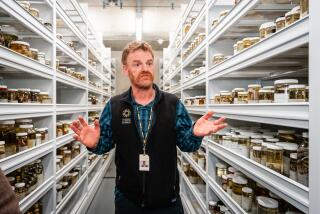‘Top Gun’ of Egyptian Snake-Catchers Carries On Tradition
- Share via
ABU RAWASH, Egypt — The writhing, 4 1/2-foot viper burst from its bound black case, but children doing their homework nearby paid little attention, dodging it in an unconcerned manner and continued their after-school lessons in their small house.
The scene is nothing unusual in this mountainous village 4 miles west of the Pyramids. Villagers here consider snakes practically part of the family.
Abu Rawash, which supplies research centers and labs in Europe, Africa, Asia and the Middle East with reptiles, birds of prey and other test animals, says that among the local populace there are more than 500 snake-catchers and -hunters.
Kisses for Cobras
The best-known snake-catcher is Mahdi Tulba, who lives, eats and sleeps with the creatures. Children at his home play with snakes, put them around their necks and even kiss them affectionately.
Tulba’s home accommodates more than 1,000 poisonous and non-venomous snakes in wooden and plastic boxes. Completing the interior decor are snake photos, skins, skeletons, stuffed cobras and scorpions in jars.
Snake-catching is an established art among the Tulba clan, and their fame has spread far beyond the banks of the Nile, bringing snake lovers from around the world to their doorstep.
“I learned the job more than 40 years ago from my father, the old Tulba, who in turn picked it up from his forefathers and relatives,” said the 45-year-old Tulba.
Respect for Reptiles
“My father taught me how to catch snakes and respect them and told me about poisonous and non-venomous reptiles,” Tulba recalled while playing with a cobra sunning itself on the roof of his four-story house in Abu Rawash.
Tulba said his catchers do not kill snakes. “But we practice maximum caution, because it is better to be safe than sorry,” he said as he related the tale of his grandfather, who died from a snake bite.
“We always say our prayers every time we go for a hunt,” said Tulba’s 22-year-old son Osama while assembling reptile paraphernalia in preparation for a hunt in the Suez Mountains.
‘Snake King’ of Egypt
Billed as the Egyptian “snake king,” Tulba said he and his men can catch between 30 and 40 snakes and 200 to 300 scorpions a day from the Abu Rawash Mountains. The haul is about the same from outings to the Sinai and Saint Catherine mountains, he added.
“I caught my first snake more than 35 years ago,” said Tulba, who says he can determine a snake’s gender and whether it is venomous from its winding track in the sand.
He said researchers use snake fat to cure rheumatism and rheumatoid arthritis and scorpion poison in contraceptives and medications for the effects of bilharzia, the parasite-induced disease that afflicts people who go barefoot in stagnant water.
But fame does not necessarily guarantee riches, and Tulba complains about “very low” prices paid by Egyptian research centers for his hard-found catches.
He says they pay 20 pounds (about $8) for a snake that would fetch $100 if sold to snake fanciers abroad.
More to Read
Sign up for Essential California
The most important California stories and recommendations in your inbox every morning.
You may occasionally receive promotional content from the Los Angeles Times.













